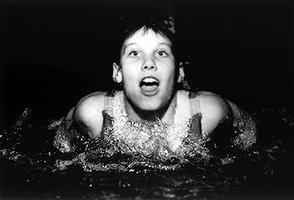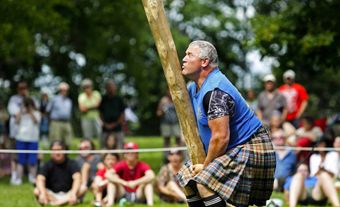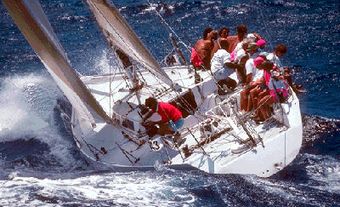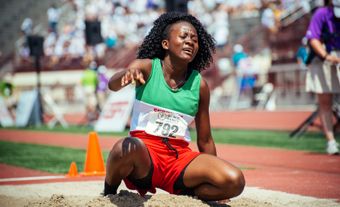Since the first British Empire Games were held at Hamilton, Ontario, in August 1930, and attended by 400 competitors representing 11 countries, Canada has been a leading proponent and participant in this quadrennial multi-sport festival. The Games are the most popular and visible symbol of the COMMONWEALTH.
Succeeding Games were held at London (England), 1934; Sydney (Australia), 1938; Auckland (New Zealand), 1950; Vancouver, 1954 (renamed the British Empire and Commonwealth Games); Cardiff (Wales), 1958; Perth (Australia), 1962; Kingston (Jamaica), 1966 (renamed the British Commonwealth Games); Edinburgh (Scotland), 1970; Christchurch (New Zealand), 1974; and Edmonton, 1978 (renamed the Commonwealth Games), by which time nearly 1500 athletes from 46 countries competed. The 1982 Commonwealth Games took place in Brisbane, Australia, and in 1986 they were in Edinburgh, Scotland. The 1990 Games were held in Auckland, New Zealand, before returning to Canada in 1994 in Victoria. In 1998 the Games were held for the first time in Asia, in Kuala Lumpur, Malaysia.
The Commonwealth Games have provided many memorable performances (10 world records were broken at Cardiff in 1958). "The Miracle Mile" at Vancouver, in 1954, when Roger Bannister of Great Britain defeated John Landy of Australia, was one of the most dramatic events in sport history.
Canadian athletes have historically excelled at the Games and always stand high in the total of medals won. In swimming, Phyllis DEWAR (1934), Elaine TANNER (1966), Graham Smith (1978) and Alex BAUMANN (1982, 1986) won 19 gold medals. Harry JEROME, an athlete of Jamaican ancestry, took the 1966 100-yard sprint at Kingston. At the 1990 Games, gymnasts Lori Strong and Curtis HIBBERT won 4 and 5 gold medals respectively.
At the XI Commonwealth Games (1978) in Edmonton, where 10 000 local volunteers assisted in the organization, Canada obtained an unprecedented 45 gold medals, 31 silver and 33 bronze, for a total of 109 (England was nearest with 27 gold and a total of 87). There were 11 sports at these Games: athletics (track and field), badminton, boxing, cycling, gymnastics, lawn bowling, shooting, swimming, weightlifting, wrestling and lacrosse (demonstration sport).
Canada obtained a total of 115 medals (51 gold) at the 1986 Games, second only to England. The outstanding competitor in Canada's 380-member team was swimmer Jane Kerr, who won 2 gold, 2 silver and 2 bronze medals. Canada's team finished third at the 1990 Games, capturing 35 gold, 41 silver and 37 bronze medals. Curtis Hibbert, Canada's top male gymnast, led the team with 5 golds, 1 silver and 1 bronze. At the 1994 Games in Victoria, Canada received 128 medals, 40 of them gold.
At the 1998 Games, Canada finished with 99 medals (30 gold, 31 silver and 38 bronze) behind Australia's 197 and England's 136. Host Malaysia, which provided superb facilities and hospitality in the steamy September heat, had 36 medals for fourth place. Among notable Canadian performances were Erika-Leigh Stirton, with 5 gold and one silver medal in rhythmic gymnastics; swimmers Mark Versfeld and Joanne Malar, with 2 gold and a bronze and one gold, 2 silvers and 2 bronzes respectively; weightlifter Akos Sandor, 3 gold; shooter Sharon Bowes, whose 2 golds and 2 silvers gave her 10 medals over 3 Games; and 13-year-old Alexandre DESPATIE, winner of the platform diving competition with a record score, the youngest medal winner in the Games' history.
In 2002 at Manchester, England, Canada's Alexandre Despatie captured an additional 2 gold medals in diving and Claire Carver-Dias won gold in synchronized swimming. (She and team-mate Fannie Létourneau also won gold in the synchronized doubles event.) Mark Boswell won gold in the men's high jump and Jean Pascal and Jason Douglas won gold in boxing. Mountain bikers Roland Green and Chrissy Redden won gold in their events, and Clara HUGHES won in road biking. Gymnast Kate Richardson captured 2 golds in gymnastics, as did Olympic gold medalist Kyle SHEWFELT. Metodi Igorov, Clayton Miller and Cynthia Meyer won in shooting, Jonathon Power won gold in squash, and Maryse Turcotte and Pascale Dorcelus captured gold in weightlifting. Sports for the disabled were also fully integrated in 2002; some exhibition events for the disabled had been included in the 1994 Games, but had been dropped in 1998.
In 2006 at Melbourne, Australia, Canadians won a total of 86 medals (26 gold, 29 silver and 31 bronze), placing Canada 3rd in the overall medal count behind the US and Australia. For the first time basketball was in the team sports repertoire. Golds were won by Canadians Chantal Petitclerc and Mark Boswell in athletics; Marie-Hélène Premont in cycling; Alexandre Despatie and Blythe Hartley in diving; Grant Golding, Elyse Hopfner-Hibbs, Alexandra Orlando, Kyle Shewfelt, and Adam Wong in gymnastics; Mike Brown in swimming; Marie-Pier Boudreau Gagnon in individual synchronized swimming; and Jeane Elizabeth Lassen, Akos Sandor, Maryse Turcotte and Amandeep Sidhu in weightlifting. The Games provided an important training ground for athletes competing at the Beijing OLYMPIC GAMES later that year.
The 2010 Commonwealth Games were held at New Delhi, India. Over 6000 athletes from 71 countries competed, including 251 Canadians. Canada placed fourth in overall standings, behind Australia, India and England, amassing a total of 76 medals (26 gold, 17 silver and 33 bronze). Canadian diver Alexandre Despatie achieved a personal best in diving, and in so doing he became Canada's most-decorated Commonwealth Games athlete, winning a total of nine gold and two bronze medals at the Commonwealth Games, including three gold medals in New Delhi.
The last time the games were held in Canada was in 1994 at Victoria, where 66 Commonwealth nations participated. That year disabled athletes joined the Commonwealth Games for the first time.
The 2014Commonwealth Games will be held at Glasgow, Scotland.
The 2010 Commonwealth Games will be held at New Delhi, India.

 Share on Facebook
Share on Facebook Share on X
Share on X Share by Email
Share by Email Share on Google Classroom
Share on Google Classroom





